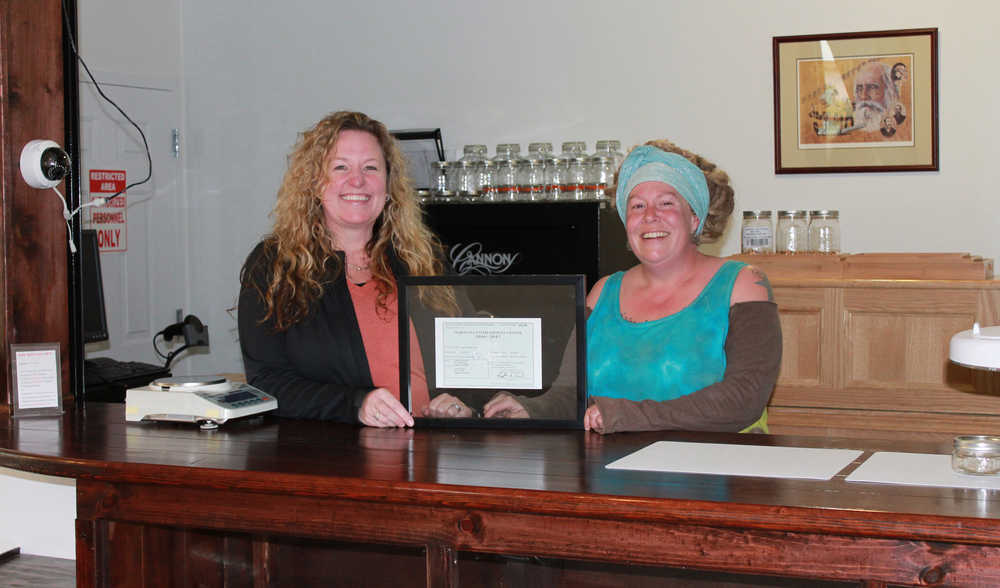Tara Bass is ready to sell you marijuana — once she gets some to sell.
On Tuesday, Bass’ business, The Remedy Shoppe, became the first retail marijuana store in Alaska to receive its operating license from the Alcohol and Marijuana Control Office. Five retail stores have received approval from the state Marijuana Control Board, but The Remedy Shoppe — on 3rd Avenue in Skagway — is the first to pass its final inspection and take its license in hand.
“We are very proud of it,” she said. “It’s taken a lot of time and paperwork.”
The Remedy Shoppe is “a small, intimate space” of about 600 square feet, Bass said by phone. “It’s actually an old historic building.”
According to Bass’ account, Alaska’s first retail marijuana store is a building that dates from Skagway’s boomtown days. When it was built in 1899, the building was home to Frank Burns, thought to be one of Soapy Smith’s henchmen.
“If the walls could talk, it would probably be a great story — and probably more stories in the future,” she said.
Bass bought the structure and started renovating it in 2009. It was a vacation rental and, according to business records, housed 49 Threads Boutique.
Bass, formerly Tara Mallory, was born and raised in Juneau, and she has a history as a businesswoman with diverse interests. She also owns and operates the Mile 0 Bed and Breakfast with her husband.
She had intended to turn the 3rd Avenue building into a pharmacy, but in 2014, Alaskans voted to legalize the commercial sale and recreational use of cannabis.
“When the laws changed for the state, I happened to be in the perfect spot in Skagway,” she said.
Under state regulations, marijuana businesses must be at least 500 feet (as the pedestrian walks) from churches, schools, youth facilities and prisons.
Skagway’s narrow confines — famously 22 blocks long and four blocks wide — created overlapping buffer zones that excluded much of its downtown.
“I happened to have a location that fit the criteria perfect for the downtown area,” she said.
The Skagway Borough Assembly unanimously approved Bass’ store in August, though some neighboring businesses had protested it earlier in the year.
“For many years we have been trying to cultivate our reputation here as a historic gold rush town, where people can be safe and bring their families,” said Averill Harp, owner of Dedman’s Photo Shop, in a June report written by the Skagway News. “(You) really need to think about that. What is that going to say to our tourists? It’s a very public place, and it’s residential.”
Bass says she doesn’t use cannabis — she tried it once and it made her paranoid — but she doesn’t have a problem with its use.
“I don’t find it any different than a liquor store,” she said.
Skagway has a significant number of liquor licenses per-capita.
Bass’ situation is somewhat unusual in that she has a retail license without an accompanying cultivation license.
According to the records kept by the Alcohol and Marijuana Control Office, most businesses seeking a retail license have arrangements to also grow their own cannabis under a separate license.
Bass doesn’t have that, which means she must rely on others to supply her store. The sole cultivation license in Skagway is owned by Coyote and Toad’s Garden LLC, run by Steven Briody and Tiffany Metz. They did not return calls for comment on Tuesday afternoon.
Even if Bass did have a cultivation license — and marijuana ready to sell — there’s another hurdle, said Cynthia Franklin, director of the Alcohol and Marijuana Control Office.
“They have to wait to get their shelves stocked until we get the testing facility certified and running,” she said.
The state’s first testing lab is expected to be CannTest in Anchorage, which should get permission to begin operating later this month.
Samples from each cultivator must be taken to the lab and approved for human consumption.
Once that happens, “then the marijuana can flow,” Franklin said.
As for Bass, she’s not sure when that will happen, and she’s willing to take her time.
“It’s just a matter of being in a … holding pattern until there is a legal product, because nothing is worth risking what we’ve already done,” she said. “Right now, the plan is to go spend some time with family until there’s things available. All the work is done until the product arrives, right?”

